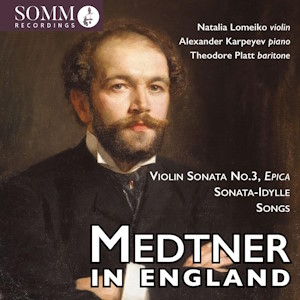
Nikolai Medtner (1880-1951)
Medtner in England
Violin Sonata No. 3 in E minor, ‘Epica’ Op. 57 (1935-38)
Sonata-Idylle in G major, Op. 56 (1935-38)
Eight Songs, Op. 61 (1927-1951)
Natalia Lomeiko (violin)
Alexander Karpeyev (piano)
Theodore Platt (baritone)
rec. 2022, Wyastone Concert Hall, Wyastone Leys, UK
Reviewed as a 96/24 WAV download
SOMM Recordings SOMM0674 [74]
Medtner is more often associated with his piano sonatas and concertos when it comes to the record catalogues, but this programme presents part of his not insubstantial catalogue of chamber music and songs which are by no means unknown even for their lower relative profile. Medtner was exiled from Russia in 1921, and the title of this album refers to his later years in England, having arrived there in 1936 to carry out comparatively modest duties as a teacher, performer and composer.
The Third Violin Sonata was in fact started in Paris in 1935, and it forms an attractive blend of Russian nostalgia as evoked in the bells of the opening, references to plainchant and whiffs of colleague composers such as Glazunov and Mussorgsky. This is by no means a densely romantic piece, and its attractions of transparency and rhythmic drive are well in evidence in the first two movements. There is certainly passion in evidence in the first movement, but even with its moments of introversion the Scherzo second movement is full of syncopation and is great fun. A certain repose is finally achieved in the Andante con moto, the deeply expressive nature and quasi-religious content of which makes it the heart of this sonata. The finale is an Allegro molto with a certain amount of virtuoso fireworks for the violin, though the essence of this sonata is in its clarity of musical material rather than in extrovert display. There is a feeling of homecoming in this finale’s procession of moods, giving the impression of an overview of what has gone before even though it is full of new stuff.
The Sonata-Idylle is, as Francis Pott points out in his booklet notes, something of a mystery in terms of its origins. In two movements, the Pastorale opening is gentle and has impressionistic moments to go along with a feel of bucolic straightforwardness. This is followed by an Allegro molto e cantabile which might be the former’s more highly-strung and sophisticated sister.
The Eight Songs Op. 61 is a collection that was brought together posthumously, with an additional song later added by the composer’s widow to the original 1954 publication of six ‘left behind’ lieder. There is therefore no reason to see this as a cycle, though the original set has a unifying character as “austere settings pondering the mysteries of human destiny.” Theodore Platt has the perfect baritone voice for these songs, imbuing them with suitably Russian darkness of tone. Platt has the range to add plenty of nuance throughout, and expressive emphasis at climaxes in performances of skilled nuance and sensitivity.
There is a certain amount of competition for the Third Violin Sonata, for instance in the Naxos recording 8.570298 with Laurence Kayaleh and Paul Stewart. This is very good, but Natalia Lomeiko has a richer violin tone and I hear more character and variety in this SOMM recording. Recorded in the same location in 2012, Chloë Hanslip and Igor Tchetuev on Hyperion CDA67963 is a heartfelt and vibrant alternative (review), but the attraction of Medtner in England is in its programme as a whole, and with glorious performances and superlative recording quality this is a disc no Medtner fan will want to be without.
Dominy Clements
Help us financially by purchasing from





















